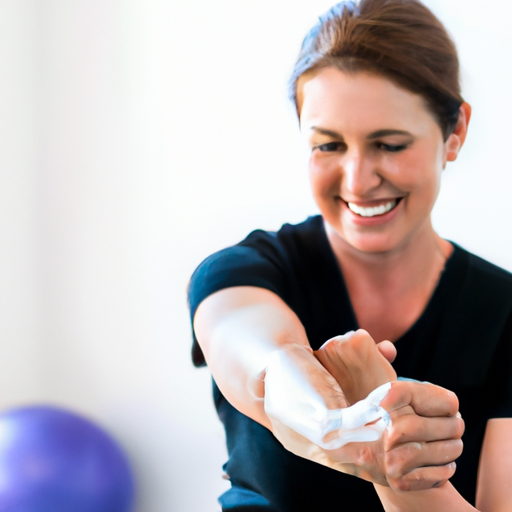
In this article, you will learn some valuable tips on how to improve your bone health. Taking care of your bones is crucial for maintaining a strong and healthy body. By following these simple steps, you can ensure that your bones stay strong and resilient.
First and foremost, it is important to consume a balanced diet that is rich in calcium and vitamin D. These nutrients are essential for bone health, as they help in the absorption and utilization of calcium. Incorporate dairy products, leafy greens, and fish into your diet to increase your calcium intake. Secondly, engaging in weight-bearing exercises such as walking, jogging, or weightlifting can help improve bone density and strength. Regular physical activity is not only beneficial for your overall health, but it also plays a vital role in strengthening your bones. Lastly, avoid habits that may weaken your bones, such as smoking or excessive alcohol consumption. These habits have been linked to lower bone density and may increase the risk of fractures. By making these changes, you can significantly improve your bone health and reduce the likelihood of bone-related problems in the future.
Understanding Bone Health
The Importance of Bone Health
Maintaining good bone health is crucial for overall well-being. Our bones provide structure and support to our bodies, protect our organs, and enable us to move. As we age, it becomes even more important to prioritize our bone health, as bone density tends to decrease, making us more susceptible to fractures and osteoporosis.
Factors Affecting Bone Health
Various factors can influence bone health. Genetics play a role, as some individuals may be predisposed to conditions like osteoporosis. Gender is also a factor, as women have a higher risk of developing osteoporosis compared to men. Additionally, hormone levels, nutritional deficiencies, certain medications, and lifestyle choices can all impact bone health.
Common Bone Health Issues
Osteoporosis is one of the most common bone health issues, characterized by low bone density and increased risk of fractures. This condition often goes unnoticed until a fracture occurs. Other bone-related problems include osteopenia, a precursor to osteoporosis, and fractures caused by falls or accidents.
Dietary Factors for Strong Bones
Calcium-Rich Foods
Calcium is an essential mineral for maintaining strong bones. Incorporating calcium-rich foods into your diet can help support bone health. Dairy products such as milk, cheese, and yogurt are excellent sources of calcium. If you are lactose intolerant or prefer non-dairy options, consider consuming calcium-fortified plant-based milk, tofu, leafy greens like kale and broccoli, and almonds.
Vitamin D and Sun Exposure
Vitamin D is crucial for absorbing calcium and facilitating its incorporation into bones. One way to obtain vitamin D is through sun exposure. Spending a few minutes outside in the sun each day can help your body produce vitamin D naturally. However, it is important to balance sun exposure to reduce the risk of skin damage. In cases where sun exposure is limited, vitamin D supplements may be necessary.
Magnesium and Bone Health
Magnesium works in synergy with calcium and vitamin D to maintain bone health. It helps regulate calcium levels in the body and supports the absorption and utilization of calcium and vitamin D. Good dietary sources of magnesium include whole grains, nuts, seeds, legumes, and leafy greens.
Exercise and Bone Health
Weight-Bearing Exercises
Weight-bearing exercises, which involve bearing your own body weight, are highly beneficial for bone health. Activities like walking, jogging, dancing, and aerobics can help strengthen bones and improve bone density. Aim for at least 30 minutes of weight-bearing exercise most days of the week.
Strength Training for Bones
Incorporating strength training exercises into your routine can also promote bone health. Resistance exercises such as weightlifting and resistance band workouts help stimulate bone growth and increase bone density. It is important to work with a qualified fitness professional to ensure proper form and minimize the risk of injury.
Balance and Flexibility Exercises
Maintaining good balance and flexibility is crucial for preventing falls and fractures. Practices such as yoga, tai chi, and Pilates can improve balance, stability, and flexibility. These gentle exercises not only benefit bone health but also contribute to overall well-being.
Lifestyle Choices for Better Bones
Avoiding Smoking and Excessive Alcohol Consumption
Both smoking and excessive alcohol consumption can have detrimental effects on bone health. Smoking reduces bone density and impairs the body’s ability to absorb calcium. Excessive alcohol intake interferes with the bone remodeling process, leading to weakened bones. Quitting smoking and moderating alcohol consumption can significantly improve bone health.
Maintaining a Healthy Body Weight
Maintaining a healthy body weight is important for overall health, including bone health. Being underweight can increase the risk of osteoporosis, while excess weight can put additional stress on the bones and joints. Strive for a balanced diet and regular exercise to achieve and maintain a healthy weight.
Getting Sufficient Sleep
Sleep plays a vital role in bone health by allowing the body to repair and regenerate tissues. During sleep, bone remodeling and growth processes occur. Aim for 7-9 hours of quality sleep each night to support optimal bone health.
Bone Health Supplements
Calcium Supplements
If you are unable to meet your calcium needs through diet alone, calcium supplements may be recommended. However, it is important to consult with a healthcare professional before starting any supplements, as excessive calcium intake can have adverse effects on your health. Your healthcare provider can determine the appropriate dosage and guide you on the usage of calcium supplements.
Vitamin D Supplements
For individuals with limited sun exposure or those who have been diagnosed with a vitamin D deficiency, supplements may be necessary. Vitamin D supplements can help ensure you meet your recommended daily intake and support proper calcium absorption. Consulting with a healthcare professional will help determine the appropriate dosage for your specific needs.
Preventing Falls and Fractures
Creating a Safe Environment
Creating a safe living environment is crucial to prevent falls and fractures, especially for older adults. Keep walkways clear of clutter, secure rugs and loose carpets, install grab bars in bathrooms, and ensure proper lighting throughout your home. These simple measures can significantly reduce the risk of accidents.
Improving Balance and Coordination
Engaging in activities that improve balance and coordination can help prevent falls. Exercises such as standing on one leg, walking heel-to-toe, and practicing yoga poses that challenge balance can strengthen the muscles and improve stability.
Being Mindful of Potential Hazards
Being mindful of potential hazards both indoors and outdoors is essential for preventing falls. Avoid slippery surfaces, use handrails on stairs, wear appropriate footwear, and be cautious of uneven or cracked pavements. Simple precautions can go a long way in safeguarding your bone health.
Bone Health in Different Life Stages
Bone Health during Childhood and Adolescence
Building strong bones is crucial during childhood and adolescence, as this is when peak bone mass is achieved. Encourage children and teenagers to engage in weight-bearing exercises, consume a nutritious diet rich in calcium and vitamin D, and limit soda consumption as it negatively affects calcium absorption.
Maintaining Bone Health in Adulthood
Maintaining good bone health in adulthood requires a combination of healthy lifestyle choices and regular exercise. It is important to continue consuming calcium-rich foods, including dairy or plant-based alternatives, and to engage in weight-bearing exercises and strength training. Regular bone density screenings may be recommended, especially for individuals with risk factors for osteoporosis.
Bone Health Concerns in Older Adults
As we age, bone health becomes a significant concern. Older adults are more prone to fractures due to decreased bone density. In addition to following the aforementioned lifestyle tips, it is crucial for older adults to undergo regular bone density screenings and discuss with their healthcare provider if any supplementation is necessary.
Medical Conditions and Bone Health
Osteoporosis and Bone Density
Osteoporosis is a condition characterized by low bone mass and deterioration of bone tissue, leading to an increased risk of fractures. It is important for individuals at risk of osteoporosis to undergo bone density tests to assess their bone health and determine the appropriate preventive measures and treatment options.
Hormonal Imbalances and Bone Health
Hormonal imbalances, such as low estrogen levels in women during menopause or low testosterone levels in men, can negatively impact bone health. Consulting with a healthcare professional to address hormonal imbalances and exploring hormone replacement therapy options when necessary can help maintain bone health.
Bone Health and Chronic Diseases
Certain chronic diseases, such as rheumatoid arthritis, celiac disease, and kidney disease, can affect bone health. These conditions may impair the body’s ability to absorb nutrients or produce hormones essential for bone health. It is crucial for individuals with chronic diseases to receive comprehensive care that includes monitoring and addressing their bone health needs.

Regular Bone Health Check-Ups
Screening Tests for Bone Health
Regular bone density screenings, such as dual-energy X-ray absorptiometry (DXA) scans, can assess bone health and detect any signs of osteoporosis or bone loss. These screenings help identify individuals at risk and allow for timely intervention to prevent fractures and maintain bone health.
Consulting a Healthcare Professional
Consulting with a healthcare professional is essential for understanding your individual bone health needs. They can evaluate your risk factors, assess your current bone health status, provide personalized recommendations, and address any concerns or questions you may have regarding your bone health.
Conclusion
Summary of Maintaining Good Bone Health
Taking care of your bone health is essential for overall well-being and quality of life. By incorporating a balanced diet rich in calcium and vitamin D, engaging in weight-bearing and strength training exercises, avoiding smoking and excessive alcohol consumption, maintaining a healthy body weight, getting sufficient sleep, and creating a safe living environment, you can take control of your bone health.
Taking Control of Your Bone Health
Remember that prevention is key, and it is never too early or too late to start taking care of your bones. By following the guidelines mentioned in this article, prioritizing regular bone health check-ups, and consulting with a healthcare professional, you can improve and maintain good bone health throughout your life. So start investing in your bone health today for a stronger, healthier, and more vibrant future.


